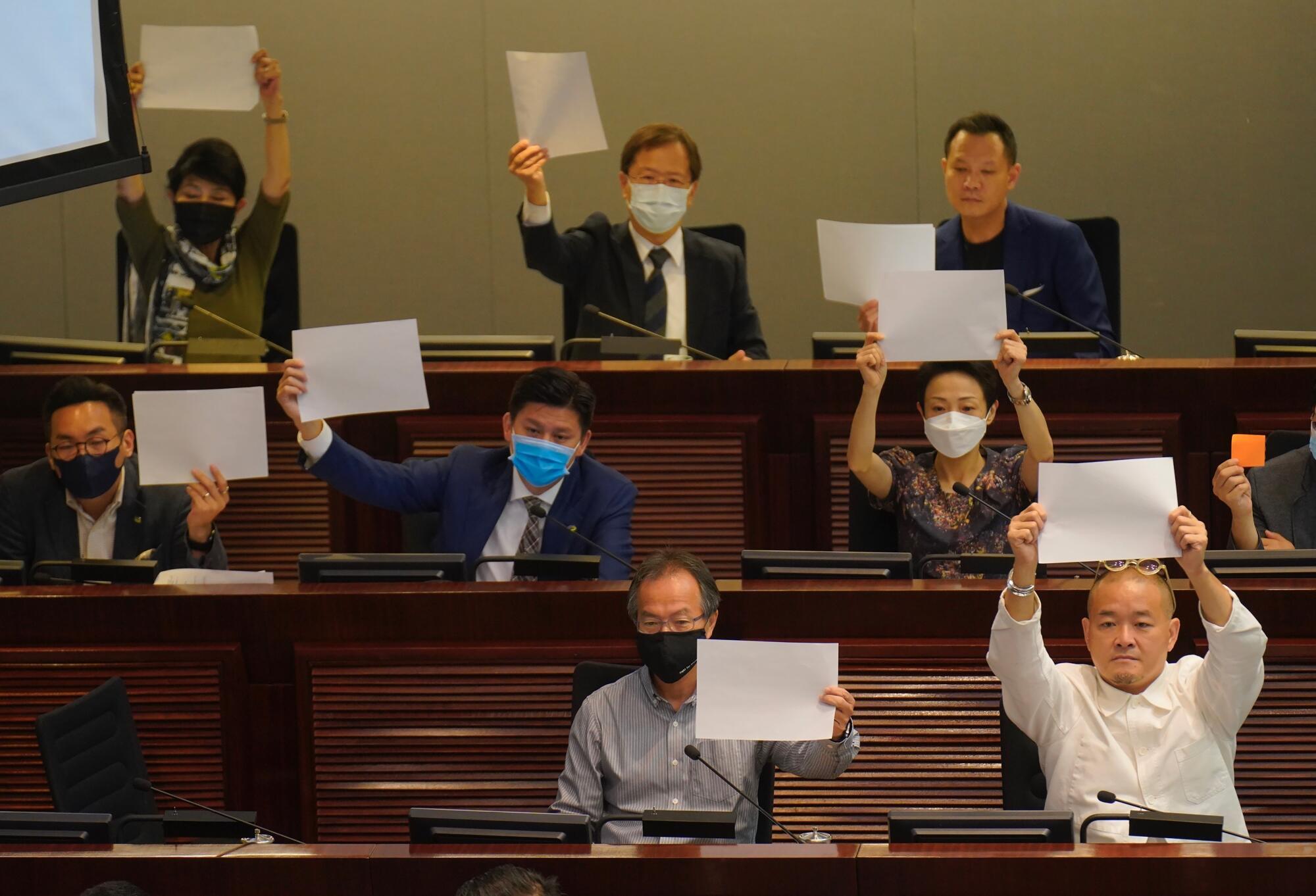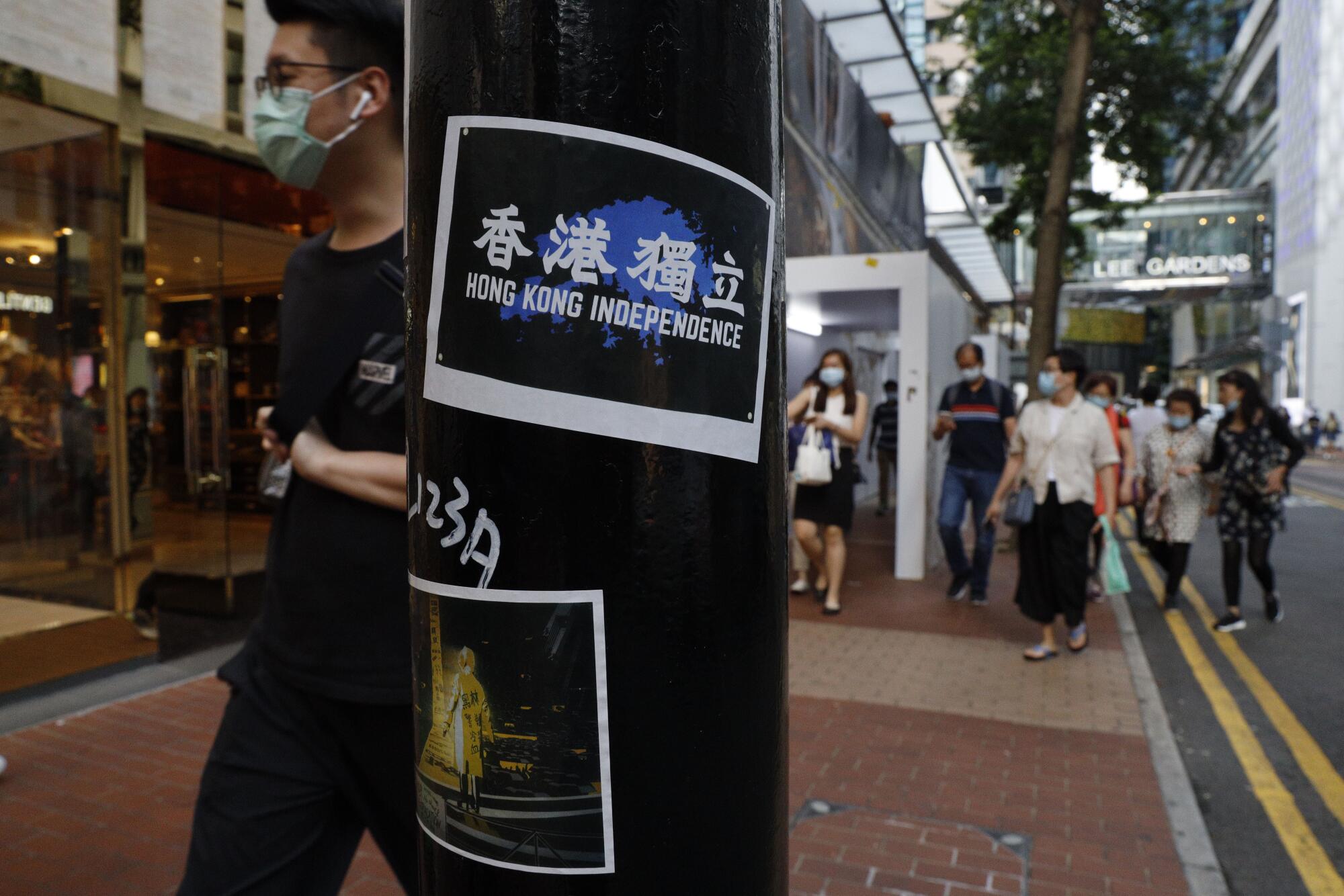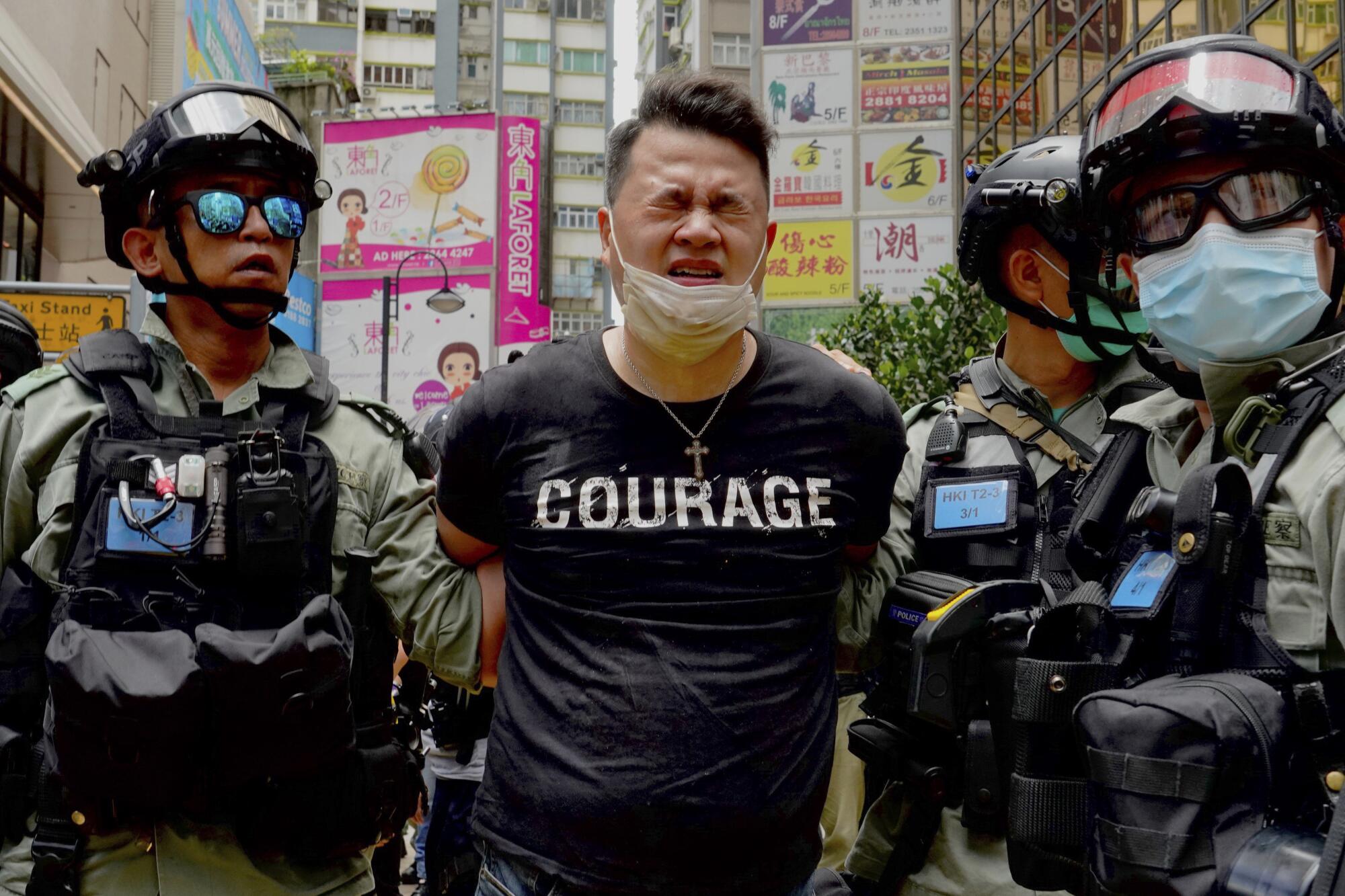- Share via
HONG KONG — There were no slogans and no words, only blank white sheets of paper, quivering in the hands of a few dozen Hong Kong residents standing in a shopping mall, saying nothing at all.
The police arrived in full riot gear, waving a flag that read: “You are in breach of the law.” They arrested eight people, searched others and dispersed the rest.
Local artist Kit Man made a cartoon of the confrontation that drew a comment at once satirical and foreboding, distilling China’s determination to crush even a whisper of dissent: “A state that can be subverted by a blank piece of paper — is it made of tofu?”
Less than two weeks under a new national security law enacted by Beijing, Hong Kong residents already feel a curtain of control falling over a city that for so long had been a brash and defiant home to intellectuals, capitalists, artists and pro-democracy activists.
Mass protests consumed the semiautonomous former British colony much of last year, escalating as the Hong Kong government gave police free rein and refused protesters’ demands. Now the central Chinese government, empowered by the world’s distraction with the COVID-19 pandemic, is imposing its will to stop what it calls “secession, subversion, terrorism and collusion with foreign forces.”
Suddenly, words and even the imagined intent behind them have become crimes.

Hundreds of people have been arrested for unlawful assembly since the law came into effect, some charged with violations including carrying items bearing protest slogans and Bible verses. No one knows what is safe. Even the word “conscience” printed on a sticker can get you into trouble in an atmosphere that is scary and increasingly surreal.
The first blank-paper protester on July 1 was a young woman who told reporters she held up white paper because she wasn’t sure what would be illegal under the new law.
She had remembered a joke she’d read from the Soviet Union: an officer once arrested a person handing out fliers on Red Square, only to find that the fliers were blank. Undeterred, the officer shouted: “You don’t think I know what you wanted to write?”
“I suddenly wanted to see whether that seemingly absurd joke has become reality,” the woman said.
Since then, a steady insinuation of authority has reached across the city the mainland Communist Party wants firmly in its grip: the protest slogan “Liberate Hong Kong, Revolution of Our Times” has been deemed illegal and subversive. Books by pro-democracy lawmakers and activists including Joshua Wong have been removed from public libraries. The protest anthem “Glory to Hong Kong” has been banned in schools.
Earlier this week, the night before primary elections for pro-democratic legislators, police raided the Public Opinion Research Institute, an election organizer and prominent polling group that had published studies showing wide dissatisfaction with the police and government. Police confiscated computers and told local news agencies they had a warrant for “dishonest use of computers.”
Hong Kong became a different world overnight, said Lee, a coffee shop owner who asked not to use her full name for protection from authorities.

“Everything seems to go on as usual, but you know nothing is the same,” she said. “You feel this constant pressure, like an invisible hand is clasped over your mouth.”
The night before the law was implemented, Lee stood in her cafe, gazing at the artwork she’d had on the walls for months. On one poster, protesters in yellow helmets and face masks stood with lifted chins before a cloud of tear gas, emblazoned with: “We create our own destiny.”
Lee began ripping the posters down.
“I have no other choice,” she said. Her shop was one of many displaying protest artwork that had been harassed in recent months with accusations of having faulty licenses or blocking public space. Staff of restaurants that openly supported protesters had been attacked in broad daylight, their shops trashed at night.
But the latest crackdown felt different.

The new law established a national security office within Hong Kong, staffed by agents who were not bound by local common law. The office could override Hong Kong’s jurisdiction in special cases. Some offenders could even be extradited to mainland China for trial — the very fear that had sparked the protests last year.
Police had also been granted new powers to raid premises without a court warrant, confiscate property, intercept communications and order internet companies to remove sensitive information.
The law would only target “an extremely small minority of people,” Hong Kong Chief Executive Carrie Lam asserted. But the text of the law extended its reach to Hong Kong residents and nonresidents alike, inside or outside of Hong Kong.
These actions sparked a small wave of wordless resistance. Pro-democracy shops took down their famous Lennon Walls — massive collages of protest messages and images that had blanketed the city last year — only to replace them with colorful walls of blank Post-it Notes.
Cartoonists drew protesters with empty speech bubbles, made emoji versions of their slogans and wrote out the tune to “Glory to Hong Kong” in numbers signifying the notes. A new graffiti theme appeared across the city: eight blank squares, each one holding space for a slogan whose absence seemed to speak out loud.
At independent bookstores, sellers said they were busy restocking political titles as customers began panic-buying books, just as they had done for rice and masks during the early days of the coronavirus outbreak.
Five of the top 10 bestsellers were sold out at Hong Kong Reader. Many of the titles were about Hong Kong’s protests, including a compilation of letters written from jail by Chan Kin-man, a leader of the pro-democracy Umbrella Movement.
“Our role becomes more important as censorship tightens at mainstream bookstores,” said Amy Lam, an employee at Mount Zero Books.
There was no formal list of banned titles — as in mainland China, Beijing’s censorship requires its subjects to figure out what may or may not be “sensitive,” thus training them in preemptive self-censorship.
“No one knows where to draw the line,” said Sidney Lui Chi-kong, a retired school librarian who runs a consulting network in Hong Kong advising librarians on keeping quality book collections.
With the new law, he’d suggested that school librarians make their own judgments on what books to remove. Many swept books about the Tiananmen Square massacre and Cultural Revolution right off the shelves, he said, but some had also removed books on protest movements in Taiwan and on Hong Kong’s colonial history.
“This is essentially a cultural purge,” Lui said.
Lee thinks so too. Back at her cafe, she poured coffee beans into a grinder. The new Hong Kong would make it harder — even dangerous and criminal — to be a “decent person,” she said. It would be so much easier to just give in, comply with the new laws, drop one’s ideals, stay alive.
“But could you live with yourself?” she asked.
Two days after the white-paper protest, one of the arrested women was photographed walking out of the police station. She had been charged with illegal assembly and obstruction of police, according to local news reports.
She paused, her belongings slung over each shoulder, her eyes steady between a face mask and cap, and raised the blank paper once again.
Times staff writer Su reported from Beijing and special correspondent Cheung from Hong Kong.
More to Read
Sign up for Essential California
The most important California stories and recommendations in your inbox every morning.
You may occasionally receive promotional content from the Los Angeles Times.











